初中英语语法过关 ——主谓一致和倒装句专项练习 精选50题 (有答案)
最新中考11专题—主谓一致和倒装(带答案)

中考11专题—主谓一致和倒装(带答案)芝麻开门左右联一致福倒知己知彼沙场点兵用兵如神考点一: 语法一致【典型例题】The reading room very quiet. I enjoy reading books there. 【2018 北京】 A. amB. isC. areD. be【考点精析】B 本题考查主谓一致。
根据句意:阅览室十分安静,我喜欢在那儿看书。
因为主语是第三人称单数,故答案为B 项。
此类题型的解题方法:根据语境判断主语谓语,最终确定答案。
教学点拨【即学即练】1. --The news very important. Tell me more about it. 【2018顺义一模】--OK.A. isB. beC. amD. are2. My bedroom dirty. I must clean it today. 【2018通州一模】A. amB. isC. areD. be3. Lucy and Lily twins. They look the same.【2018怀柔二模】A. beB. amC. isD. are4. My shirt white and my trousers blue.A. are; areB. are; isC. is; isD. is; are5. Our knowledge of computer growing all the time.A. beB. isC. areD. were6. I think maths very difficult to learn.A. isB. areC. hasD. have【答案】1.A 2.B 3.D 4.D 5.B 6.A考点二: 意义一致【典型例题】--How soon can you finish this job?【2018自贡】--Two days enough for me to finish the work. I need a week.A. isn’tB. aren’tC. is【考点精析】A 本题考查主谓一致。
九年级英语主谓一致与倒装句单选题50题

九年级英语主谓一致与倒装句单选题50题1.Neither the students nor the teacher ____ in the classroom.A.isB.areC.wasD.were答案:A。
解析:neither...nor...连接两个主语时,谓语动词遵循“就近原则”,teacher 是单数,所以用is。
2.The team ____ discussing the plan.A.isB.areC.wasD.were答案:B。
解析:team 在这里表示队员们,是集体名词表示复数概念,所以用are。
3.The news ____ very important.A.isB.areC.wasD.were答案:A。
解析:news 是不可数名词,谓语动词用单数is。
4.The cattle ____ grazing in the field.B.areC.wasD.were答案:B。
解析:cattle 是复数名词,谓语动词用are。
5.The police ____ looking for the thief.A.isB.areC.wasD.were答案:B。
解析:police 是集体名词表示复数概念,谓语动词用are。
6.The family ____ having dinner.A.isB.areC.wasD.were答案:B。
解析:family 在这里表示家人,是集体名词表示复数概念,所以用are。
7.Bread and butter ____ my favorite breakfast.A.isB.areD.were答案:A。
解析:bread and butter 是一种组合,看作一个整体,谓语动词用单数is。
8.The group of students ____ listening to the teacher.A.isB.areC.wasD.were答案:B。
解析:a group of students 表示一群学生,是复数概念,谓语动词用are。
专题15主谓一致和倒装句精练(附答案)

专题15 主谓一致和倒装句精练—2022中考英语1.—_______ there lots of bread in the fridge?—Sorry, we don’t have _______.A.Are; any B.Is; any C.Has; some D.Do; some2.—What does your father do in the morning?—He usually ________.A.watch TV B.exercises C.read books D.go to the movies3.— Has Allen won a prize in the dancing petition?— Yes, ________ Allen ________ Jack has.A.both, and B.neither, nor C.not only, but also4.In the movie The Captain (中国机长), the pilot along with all the passengers ________ lucky to survive the air crash due to his extraordinary skills.A.was B.were C.to be D.being5.In our school library, there ______ a number of books on science and the number of ______ growing larger and larger.A.is; are B.are; is C.is; is D.are; are6.Fifty percent of the class ________ most of the work. The work left ________ really difficult.A.are doing, is B.are doing, are C.is doing, is D.is doing, are7.—Why are you in such a hurry?—There ________ an NBA basketball game in ten minutes.A.will be B.will have C.is going to have D.are going to be8.They _________ play basketball next weekend.A.go to B.goes to C.is going to D.are going to9.In our school, the number of men teachers ________ more than 100 now.A.is B.are C.was D.were10.The number of the tourists to Taizhou ________ and a number of them ________ their holiday during their stay. A.is getting more and more; enjoys B.is getting larger and larger; enjoysC.is getting more and more; enjoy D.is getting larger and larger; enjoy【参考答案】1.B 2.B 3.C 4.A 5.B 6.A 7.A 8.D 9.A 10.D1.【详解】句意:——冰箱里有很多面包吗?——对不起,我们没有。
初中英语主谓一致的技巧及练习题及练习题(含答案)含解析
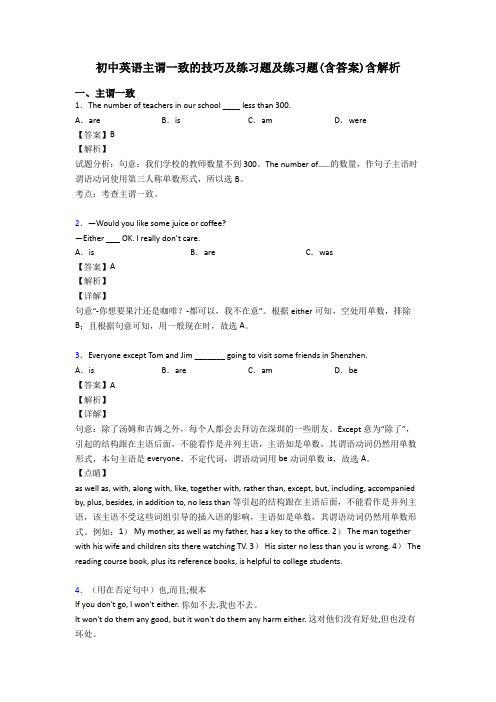
初中英语主谓一致的技巧及练习题及练习题(含答案)含解析一、主谓一致1.The number of teachers in our school ____ less than 300.A.are B.is C.am D.were【答案】B【解析】试题分析:句意:我们学校的教师数量不到300。
The number of……的数量,作句子主语时谓语动词使用第三人称单数形式,所以选B。
考点:考查主谓一致。
2.—Would you like some juice or coffee?—Either OK. I really don’t care.A.is B.are C.was【答案】A【解析】【详解】句意“-你想要果汁还是咖啡?-都可以,我不在意”。
根据either可知,空处用单数,排除B;且根据句意可知,用一般现在时,故选A。
3.Everyone except Tom and Jim _______ going to visit some friends in Shenzhen.A.is B.are C.am D.be【答案】A【解析】【详解】句意:除了汤姆和吉姆之外,每个人都会去拜访在深圳的一些朋友。
Except意为“除了”,引起的结构跟在主语后面,不能看作是并列主语,主语如是单数,其谓语动词仍然用单数形式,本句主语是everyone,不定代词,谓语动词用be动词单数is,故选A。
【点睛】as well as, with, along with, like, together with, rather than, except, but, including, accompanied by, plus, besides, in addition to, no less than 等引起的结构跟在主语后面,不能看作是并列主语,该主语不受这些词组引导的插入语的影响,主语如是单数,其谓语动词仍然用单数形式。
中考英语总复习主谓一致及倒装(巩固练习)习题及答案

【稳固练习】I.单项选择。
1. — ______ a nice day!— ______.A. How; So is itB. What; So is itC. What; So it isD. How, So it is2.— I have never been to Hawaii. What about Mike?— _______.A. So has heB. So he doesC. Neither he hasD. Neither has he 3. Our class are going to have a picnic tomorrow. If you don ’tgo, ______. A. so do I B. neither do I C. neither will I D. so will I 4. The reading room ______ very quiet . I enjoy reading books there . A . am B. is C. are D. be5. Last Sunday my aunt ______ at home with me . We were watching TV all day.6.— Leo, _________ no milk or eggs in the fridge .— Oh, I’ll go and buy some right away .7.— How much _______ the pair of shoes?— Twenty dollars _______ enough .A .is; is B. is; are C. are; is D. are; are8. ________ less milk in this bottle than in that one .A .There haveB .There has C. There is D. There are 9.— I never drink coffee .— ________.A .So do IB . So did I C.Neither did I D .Neither do I 10.— Tom, I ’ m watching a football match. What about you?— _________.A . So do I.B .So am I. C. So I do. 11. ________ Tom ________ Mary speaks good Chinese Chinese students very well .D. So I am., so they can communicate with theseA . Neither ;norB . Not only ; but alsoC. Both ; and D . Either ; or12. — It ’s terribly cold today , isn’tit?— Yes. ________ yesterday.13. ________ the teachers in their school is about 200and one fourth of them are ________ teachers.A . A number of ; womenB .A number of ; womanC. The number of ; women D . The number of ; woman15. I am not watching TV , ________ is Jim .A .also B. either C. neither D. so14. There ________ a few students in the library after school every dayA . has beenB . have been C. is D. are16. Both of the students ________ from England ..A .am B. is C. are D. be17. Physics ________ easy for us to learn .A .am B. is C. are D. be18.— ______ for you. Happy birthday!— Thank you.A. Your present is hereB. This is a presentC. Here is a presentD. A present is this19.— Your father is very strict with you.— _______. He never lets off a single mistake of ours.20.— Here ____! Where is Xiao Liu ?-There ____.A. comes the bus; is heB. comes the bus; he isC. the bus comes; is heD. the bus comes; he isII.用括号内所给单词的合适形式填空。
专题 主谓一致和倒装句--中考英语重点语法精讲精练(全国通用,含答案)

主谓一致和倒装句精讲—中考英语【考点】从单项选择到书面表达,都可能涉及到主谓一致的题,是中考试卷必考题目。
主谓一致是指谓语动词与主语在人称和数上保持一致。
主谓一致必须遵循三个原则,即语法一致原则、意义一致原则、就近一致原则。
语法一致原则是指主语和谓语在语法形式上保持一致,即主语是单数形式,谓语动词用单数形式,主语是复数形式,谓语也用复数形式。
意义一致原则是主语意义上的单复数要与谓语的单复数形式一致,即主语形式上为单数,但意义为复数,则谓语动词用复数形式;若主语形式上为复数,但表示单数意义,则谓语动词用单数形式。
就近一致原则也叫邻近原则,是指谓语动词的单、复数形式取决于最靠近它的主语。
倒装句因为与汉语语言习惯的不同和较多的句型结构而成为初中英语的难点,在中考试卷中也总有一定的比例,尤其在阅读理解和完形填空中对上下文的理解会有很大的影响,因此也是中考复习的重点。
【精讲01】语法一致原则谓语和主语通常从语法形式上取得一致,主语为单数形式,谓语动词也用单数形式;主语为复数形式,谓语动词也为复数形式。
如:The boy is clever enough to study maths well. 这个男孩够聪明,可以把数学学好。
Everybody in my class tries to do well in English. 我们班每个人都努力学好英语。
►下列情况谓语动词只能用单数:1)不可数名词或可数名词单数作主语,谓语动词用单数形式。
如:Water is very important to the trees. 水对树来说非常重要。
2)动词不定式或者动名词短语作主语时,谓语动词用单数形式。
如:To improve your English is the most important work.提高你的英语是最重要的工作。
Watching TV too much is bad for your eyes. 看电视太多对你的眼睛有害。
【英语】初中英语主谓一致专项训练100(附答案)含解析

【英语】初中英语主谓一致专项训练100(附答案)含解析一、主谓一致1.Dad, this phone is ringing, I guess either you or Mum on the phone.A.want B.are wantedC.wants D.is wanted【答案】D【解析】试题分析:句意:我猜电话或者是找你的或者是找妈妈的。
主语you or Mum是want的承受者,故句子用被动语态;either … or …连接并列主语,谓语动词根据就近原则故用is,故选D。
考点:考查一般现在时的被动语态。
2.Alice, together with her classmates punished for breaking the school rules last week. A.is B.are C.was D.were【答案】C【解析】【详解】句意:艾丽斯和她的同学上周因违反校规而受到惩罚。
考查一般过去时和主谓一致。
根据last week可知句子时态应用一般过去时,排除A、B选项;together with her classmates在句中作状语,主语是Alice,第三人称单数,所以谓语动词也要用第三人称单数形式,排除D选项;故答案选C。
3.(通常与or连用)或者Either you or your father must see this young man today. 你或是你的父亲今天必须见这位年轻人。
副词 ad.4.The life we were used to _______ greatly since 1992.A.change B.have changed C.changing D.has changed【答案】D【解析】试题分析:句意:我们过去的生活自从1992年后有了巨大的变化。
本题需要断句正确,we were used to作句子主语的定语,句子缺少谓语动词,根据时间状语since 1992,可知句子的谓语用现在完成时态,主语是the life 用第三人称has changed,故选D。
七年级英语主谓一致练习题50题(答案解析)
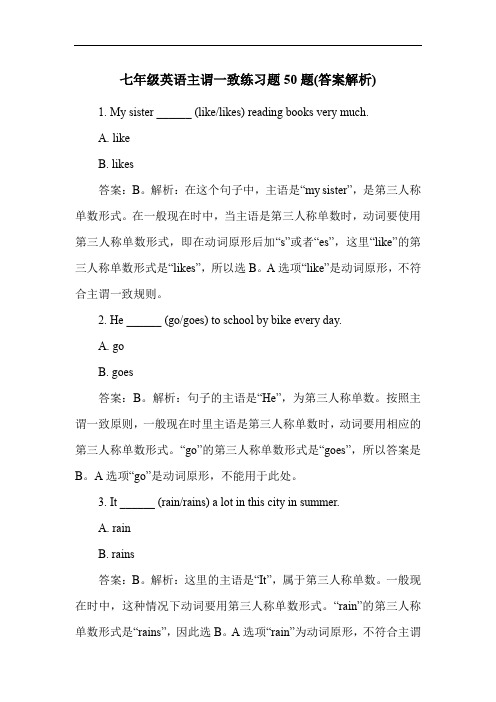
七年级英语主谓一致练习题50题(答案解析)1. My sister ______ (like/likes) reading books very much.A. likeB. likes答案:B。
解析:在这个句子中,主语是“my sister”,是第三人称单数形式。
在一般现在时中,当主语是第三人称单数时,动词要使用第三人称单数形式,即在动词原形后加“s”或者“es”,这里“like”的第三人称单数形式是“likes”,所以选B。
A选项“like”是动词原形,不符合主谓一致规则。
2. He ______ (go/goes) to school by bike every day.A. goB. goes答案:B。
解析:句子的主语是“He”,为第三人称单数。
按照主谓一致原则,一般现在时里主语是第三人称单数时,动词要用相应的第三人称单数形式。
“go”的第三人称单数形式是“goes”,所以答案是B。
A选项“go”是动词原形,不能用于此处。
3. It ______ (rain/rains) a lot in this city in summer.A. rainB. rains答案:B。
解析:这里的主语是“It”,属于第三人称单数。
一般现在时中,这种情况下动词要用第三人称单数形式。
“rain”的第三人称单数形式是“rains”,因此选B。
A选项“rain”为动词原形,不符合主谓一致要求。
4. She ______ (have/has) a beautiful doll.A. haveB. has答案:B。
解析:此句主语是“She”,是第三人称单数。
在一般现在时里,当主语是第三人称单数时,动词“have”要变为“has”,所以答案为B。
A选项“have”是动词原形,不能与第三人称单数主语搭配。
5. The cat ______ (catch/catches) mice at night.A. catchB. catches答案:B。
初中英语主谓一致及其解题技巧及练习题(含答案)含解析

初中英语主谓一致及其解题技巧及练习题(含答案)含解析一、主谓一致1.Not only my friends but also I interested in football and Messi is our favorite star.A.are B.be C.is D.am【答案】D【解析】试题分析:句意:不仅我的朋友们而且我都对足球感兴趣,Messi是我们最喜爱的球星。
not only...but also...,不仅……而且……,连接两个并列的结构,在句中做主语时,谓语动词的单复数形式根据就近原则。
所以这里的be动词应该跟I一致,故选D。
考点:考查主谓一致。
2.There _________ a great concert in the theater next Saturday evening.A.is B.will haveC.is going to be D.was【答案】C【解析】句意“下个星期六晚上在剧院有一场大型的音乐会”。
there be表示“有”,且不和have连用,根据next Saturday evening可知,用一般将来时,故选C。
3.—What kind of movies do you prefer?—I prefer the movies _________me something to think about.A.which give B.that gives C.which gives D.who gives【答案】A【解析】句意:——你喜欢什么类型的电影?——我更喜欢那些让我思考的电影。
此句的先行词是movies,引导定语从句的关联词用that或which,排除C,D;定语从句的主语that或which 指代movies,动词不能用三单形式,故答案为A。
4.It is reported that half of the China’s population __________ working in cities in 2015 to make money.A.Are B.is C.was D.were【答案】D【解析】【详解】句意:据报道,2015年中国有一半的人口在城市上班挣钱。
英语的主谓一致与倒装句练习题

英语的主谓一致与倒装句练习题一、主谓一致练习题(一)语法一致原则1、 Each of the students ______ a new dictionaryA hasB haveC is havingD are having答案:A解析:each of +复数名词作主语时,谓语动词用单数形式。
2、 Neither of them ______ in JapanA isB areC wasD were答案:A解析:neither of +复数名词作主语时,谓语动词用单数形式。
3、 Not only my parents but also my sister ______ to the partyA are goingB is goingC areD is答案:B解析:not onlybut also连接两个主语时,谓语动词遵循“就近原则”,my sister 是第三人称单数,所以谓语动词用 is going。
4、 The number of the students in our class ______ 50、A isB areC hasD have答案:A解析:the number of +复数名词,表示“……的数量”,作主语时,谓语动词用单数形式。
5、 A pair of shoes ______ under the bedA isB areC wasD were答案:A解析:a pair of +复数名词作主语时,谓语动词与 pair 的形式保持一致,a pair 是单数,所以谓语动词用 is。
(二)意义一致原则1、 The family ______ having dinner when I came inA isB areC wasD were答案:D解析:family 作“家庭”讲时,是单数;作“家人”讲时,是复数。
此处指“家人正在吃饭”,所以用复数 were。
2、 The police ______ looking for the lost childA isB areC wasD were答案:B解析:police 是集合名词,作主语时,谓语动词用复数形式。
初中英语主谓一致常见题型及答题技巧及练习题(含答案)含解析

初中英语主谓一致常见题型及答题技巧及练习题(含答案)含解析一、主谓一致1.一There a book sale in our school.Would you like to have a look with me?一Sure.I'd love to.A.is B.have C.are【答案】A【解析】【详解】句意:——我们学校有卖书的活动,你愿意和我一起去看看吗?——当然。
我很乐意。
本题考查there be结构,表示某地有某物;而have是指某人有某物,空前面是There,因此考查的是there be结构,排除B;再由a book sale是单数名词,因此be 动词用is。
故选A。
2.—Tell us something about Canada, OK?—I’m sorry. _______ Jack ______ I have ever been there.A.Either; or B.Not only; but also C.Both; and D.Neither; nor【答案】D【解析】试题分析:句意:告诉我们一些关于加拿大的事,好吗?很抱歉,我和杰克都没有去过那儿。
neither…nor…,既不······也不······,either …or…,或者······或者······,Not only …but also…,不但,而且。
如果连接的是主语,谓语动词与较近的名词保持一致,即就近原则。
both… and…,······和······都,作主语表示复数。
【语法练习】主谓一致50道(有答案)
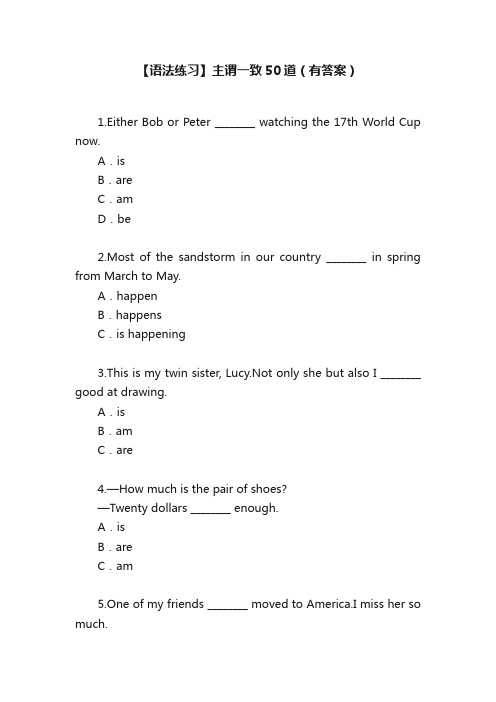
【语法练习】主谓一致50道(有答案)1.Either Bob or Peter ________ watching the 17th World Cup now.A.isB.areC.amD.be2.Most of the sandstorm in our country ________ in spring from March to May.A.happenB.happensC.is happening3.This is my twin sister, Lucy.Not only she but also I ________ good at drawing.A.isB.amC.are4.—How much is the pair of shoes?—Twenty dollars ________ enough.A.isB.areC.am5.One of my friends ________ moved to America.I miss her so much.A.hasB.haveC.isD.are6.—Physics ________ more difficult than Chinese, do you think so?—Yes, I think so.A.isB.areC.has7.—He, together with his parents, ________ going to visit Shanghai in July.How about you?— I'm afraid I have to stay at home ________.A.are; on my ownB.is; by myselfC.is; by my ownD.are; on myself8.Each of the girls here ________ to the West Lake twice.A.have goneB.have beenC.has goneD.has been9.—Which would you like, tea or coffee?—Either ________ OK, but I prefer coffee ________ milk.A.is; withB.is; toC.are; withD.are; to10.—What can you see in the picture?—I can see a farm.And there ________ a lot animals on it.A.isB.areC.will beD.be11.—How soon can you finish this job?—Two days ________ enough for me to finish the work.I need a week.A.isn'tB.aren'tC.is12.Everyone except Tom and Mike ________ Kunming before.A.has gone toB.have gone toC.has been toD.have been to13.—Both Li Lei and Han Meimei ________ fond of the TV program A Bite of China.—I am also deeply moved by its stories!A.isB.amC.wasD.are14.________ that pair of ________ a little cheaper?A.Is; glassB.Are; glassC.Is; glassesD.Are; glasses15.Parents around the world ________ worried about children playing too many video games.A.isB.wasC.are16.A lot of foreigners ________ familiar with the famous places of interest in China.A.amB.isC.areD.be17.Look, everyone in the group ________ talking actively about their ideas.A.isB.areC.hasD.have18.One of the popular expressions in 2012 ________ “positive energy”.A.isC.wasD.were19.—Maths ________ my favourite subject, what about you?—Physics ________.I think it's very interesting.A.is; isB.are; areC.are; is20.In our school library there ________ a number of books on science, and in these years the number of them ________ growing larger and larger.A.are; isB.is; areC.have; areD.has; is21.Not only my friends but also I ________ interested in football and Messi is our favorite star.A.beB.amC.isD.are22.Everyone except Tom and John ________ there when the meeting began.A.areB.isC.were23.Doing exercise ________ good for your health.A.beB.amC.isD.are24.Neither of the books ________ interesting.I won't buy ________ of them.A.is; eitherB.are; neitherC.is; any25.Climbing hills ________ good for our health.A.areB.isC.wasD.were26.________ of the students in our class ________ girls.A.Two fifth; isB.Two fifth; areC.Two fifths; are27.There ________ lots of sheep and pigs on my uncle's farm now.A.wasB.wereC.is28.Look! The police ________ the food onto the bank of the river.A.am carryingB.is carryingC.are carryingD.are carried29.—What are you going to do this weekend?—I together with my classmates ________ going to climb Mount Qian.A.isB.amC.areD.were30.—David has been away for more than 25 days.—I miss him very much.You know, 25 days ________ short.A.isB.isn'tC.areD.aren't31.There ________ more and more foreigners learning Chinese now.A.isB.areC.wasD.were32.Look, the set of keys ________ on the teacher's desk.A.areB.wereC.isD.was33.Look! The passenger in front of you ________ games with his HTC One M8.A.is playingB.are playingC.were playingD.has gone34.Neither the headmaster nor the teachers ________ take a vacation next week.A.were going toB.is going toC.was going toD.are going to35.Three million ________ a large number.You can make it ________.A.are; smallB.is; smallerC.is; smallD.are; smaller36.—How many teachers are there in your school?—________ them ________ over one hundred.A.The number of; isB.The number of; areC.A number of; are37.There ________ some milk and apples in the fridge.A.hasB.haveC.isD.are38.Doing eye exercises ________ one of the useful ways to protect our eyes.A.isB.areC.were39.Hou Yi Shoots the Suns ________ one of the most traditional stories in China.A.wasB.isC.are40.—How many people are there in your group?—Four.Three boys ________ in our group this time.A.isB.areC.wereD.was41.—What would you like to have for supper?—Either noodles or rice ________ OK.I don't mind.A.areB.wereC.isD.was42.Is there anything ________ to you?A.that is belongB.that belongC.that belongsD.which belongs43.A smile ________ nothing, but gives much.A.costsB.spendsC.costD.spent44.—Mom, I watched TV for only forty minutes.Sometimes ________ TV is good for us.—Forty minutes ________ enough.Now you must do your homework.A.watch; isB.watching; wasC.watched; areD.watching; were45.It's said that ________ of the water around the world ________ polluted.A.two thirds; hasB.two thirds; isC.two third; areD.two thirds; have46.—Look! How clean the classroom is!—Yes.I'm sure someone ________ it up.A.cleansB.is cleaningC.will cleanD.has cleaned47.Look! Some visitors ________ for the bus over there.A.are waitingB.is waitingC.waitingD.wait48.—Is your mother a teacher?—Yes, she is.She ________ at a junior high school.A.taughtB.teachesC.will teachD.is teaching49.Mary with her parents often ________ for a walk in the park after supper.A.goB.is goingC.are goingD.goes50.The writer and speaker ________ a speech on Chinese culture in the hall now.A.are givingB.is givingC.will giveD.has given答案请在菜单栏回复:20160605长按二维码,关注中考英语。
主谓一致和倒装句练习题
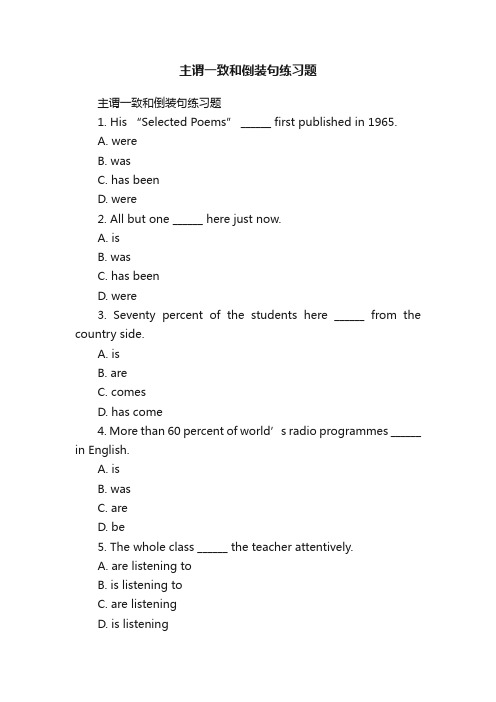
主谓一致和倒装句练习题主谓一致和倒装句练习题1. His “Selected Poems” ______ first published in 1965.A. wereB. wasC. has beenD. were2. All but one ______ here just now.A. isB. wasC. has beenD. were3. Seventy percent of the students here ______ from the country side.A. isB. areC. comesD. has come4. More than 60 percent of world’s radio programmes ______ in English.A. isB. wasC. areD. be5. The whole class ______ the teacher attentively.A. are listening toB. is listening toC. are listeningD. is listening6. The United States of America ______ one of the most developed countries in the world.A. isB. areC. wasD. were7. The air in big cities ______ very dirty by factories.A. are often madeB. is often madeC. have often madeD. has often made8. A large number of students of this school _______ fond of playing football.A. areB. wasC. isD. be9. Mary as well as her sisters ______ Chinese in China.A. are studyingB. have studiedC. studiesD. study10. I, who ______ your teacher, will try my best to help you with your lessons.A. beB. amC. areD. is11. Ten dollars ______a big sum for a small child , and they will go a long way .B. beingC. haveD. is12. The rich ______ not always happy.A. areB. isC. hasD. have13. Apples of this kind _______.A. tastes goodB. tastes wellC. taste goodD. taste well14. The Olympic Games _______ held every _______ years.A. is...fourB. are...fourC. is...fiveD. are (iv)15. No one but her parents ______ it.A. knowB. knowsC. is knowingD. are knowing16. ______ a good enough price for this book.A. Two yuans areB. Two yuan areC. Two yuans isD. Two yuan is17. No bird and no beast _______ in the lonely island.A. are seenB. is seenC. see18. The news of victories ______ spreading far and wide.A. isB. areC. have beenD. were19.Few of his family ______ with his imaginative ideas.A. agreeB. agreesC. are agreedD. is agreed20. The paper for books and newspapers _____ made of wood.A. areB. isC. hasD. have21. Neither your mother nor you ______ at home.A. amB. isC. areD. be22. It is she who _______ wrong.A. isB. amC. areD. has been23. ________ well looked after in that hospital.A. Wounded areB. Wounded isC. The wounded areD. The wounded is24. Twenty of us are old. The rest _______ young.A. isB. areC. wasD. were25. The Smiths ______ to move into the new building.A. areB. isC. hasD. will26. It is said the police _______ trying their best to catch the murderer.A. haveB. hasC. isD. are27. Here ______ a new pair of shoes for you.A. isB. areC. haveD. has28. The best ______ still unknown.A. isB. areC. beD. were29. We each _______ to pass the entrance examinations.A. hopesB. hopeC. hopingD. is hoping30. Bread and butter ______ a kind of food.A. isB. areC. amD. be31. The watch and chain ______ of gold.A. is madeB. are madeC. were madeD. am made32. Half the eggs ______ bad.A. isB. areC. amD. be33. ______ this pair of glasses ______ her well?A. Is...fitB. Do...fitC. Does...fitD. Are (i)34. About eighty percent of the students in his class ______ below sixteen.A. isB. areC. amD. be35. There ______ a map of the world and some pictures on the wall.A. isB. areC. amD. be36. A large quantity of water pipes ______ needed.A. areB. isC. hasD. have37. Large quantities of paper ______ wasted.A. areB. isC. hasD. have38. How and why he ______ come to Princeton, New Jersey ______ a story of struggle, success and sadness.A. had…wasB. had… areC. had… hasD. had… have39. Not only I but also Jessie and Mary _____ tired of having one examination after another.A. isB. areC. amD. be40.My driving licence , rather than my credit cards, ______lost .,A. haveB. areC. isD. has41. Nobody but Jane and Mary ______ secret.A. knowB. knowsC. have knownD. is known42. A great deal of ______ was done to crops.A. damagesB. damagingC. damageD. ruin43. —Do you want the pants?—My pants ______ laid in bed.A. isB. wasC. areD. being44. I told him what I was surprised ______ his attitude towards his study.A. isB. wasC. at isD. at was45. I have finished a large part of the book; the rest _______ more difficult.A. isB. areC. wasD. were46. They each ______ a new dictionary.A. hasB. haveC. isD. are47.The pilot as well as four of the passengers ______death .A. has escapedB. have escapedC. has been escapedD. have been escaped48. Every hour and every minute ______ important.A. areB. wereC. isD. will49. Nobody except Bill and Johnny ______entered the second round of the interview.A. haveB. hasC. have beenD. has been50. He is one of the old scientists who ______nothing about his personal income and fame .A. caresB. careC. is caringD. are caring1. Not until I began to work ____ how much time I had wasted.A. didn't I realizeB. did I realizeC. I didn't realizeD. I realized2. Only by practising a few hours every day ____ be able to master the language.A. you canB. can youC. you willD. will you3. If you don't go,neither ____.A. shall IB. do IC. I doD. I shall4. No sooner ____ to the station ____ the train left.A. had I got,whenB. I had got,thanC. had I got,thanD. did I get,when5. ——Your father is very strict with you.____. He never lets off a single mistake of ours.A. So he isB. So is heC. He is soD. So does he6. ____ today,he would get there by Sunday.A. Would he leaveB. Was he leavingC. Were he to leaveD. If he leave7. Never in my life ____ such a thing.A. I have heard or have seenB. have I heard or seenC. I have heard or seenD. did I hear or see8. ——Here ____!Where is Xiao Liu?There ____.A. comes the bus,is heB. comes the bus,he isC. the bus comes,is heD. the bus comes,he is9. ____ ,I will not buy it.A. Much as do I like itB. As much I like itC. Much as I like itD. As I like it much10. ——I like football. I don't like volleyball.____.A. So do IB. Neither do IC. So it is with meD. So is it with me11. _____ the expense,I _____ to Italy.A. If it were not,goB. Were it not for,would goC. Weren't it for,will goD. If it hadn't been,would have gone12. So _____ in the darkness that he didn't dare to move an inch.A. he was frightenedB. was he frightenedC. frightened he wasD. frightened was he13. ——In modem times,girls like beautiful clothes.Yes, _____ and . After all, our life has greatly improved.A. so do they,so do youB. so they do,so you doC. so do they,so you doD. so they do,so do you14. ——You have an English class every day except Sunday._____.A. So we haveB. So we doC. So have weD. So do we15. I wonder if your wife will go to the ball. If your wife _____,so _____ mine.A. does,willB. will,doesC. will,wouldD. does,do16. Only after I read the text over again _____ its main idea.A. that I knewB. did I knewC. 1 could knowD. I did know17. ——You seem to have learned all the English words by heart._____ .A. So l doB. So do lC. So I haveD. So have I18. ——I seldom watch TV,but listen to the radio a lot._____ .A. So do IB. Neither do IC. I m the sameD. So it is with me19. So excited _____ that he couldn't say a word.A. he seemedB. did he seemC. was he seemingD. he did look20. Jimmy was so nervous not a single word _____ down in the dictation.A. he wroteB. he was writtenC. did he writeD. was he written21. Little ______ when 1 took the trip where it would lead me.A. have I knownB. had I knownC. do 1 knowD. did I know22. ——Have you ever seen anything like that before?---- ____.A. No,I never have seen anything like that beforeB. No,never I have seen anything like that beforeC. No,never have 1 seen anything like that beforeD. No,I have seen anything like that before never23. _____ ,1 would accept the invitation and go to the party.A. Were I youB. Was I youC. Had I been youD. Would 1 be you24. You should work less _____.A. and neither should IB. and so should IC. and nor should ID. and so I should25. _____ and caught the mouse.A. Up the cat jumpedB. The cat up jumpedC. Up jumped the catD. Jumped up the cat26. Not only _____ a promise,but also he kept it.A. did he makeB. he madeC. does he makeD. has he made27. His uncle is a worker and has been working in the factory for more than ten years. _____.A. So is his auntB. So has his auntC. So his aunt doesD. So it is with his aunt28. Not once _____ their plan.A. did they changeB. they changedC. changed theyD. they did change29. ——Do you know Jim quarreled with his brother?I don't know, and ______ .A. nor don't I careB. nor do I careC. I don't care neitherD. I don't care also30. Not until he arrived home _____ he find that this wallet had been stolen.A. didB. wouldC. whenD. that31. ——This is one of the oldest trees in the world._____ such a big tree.A. Never I have seenB. I haven't never seenC. Never have I seenD. I have seen never32. Nowhere else in the world _____ cheaper tailoring(裁缝业,成衣业)than in Hong Kong.A. a tourist can findB. can a tourist findC. a tourist will findD. a tourist has found33. _____ succeed in doing anything.A. Only by working hard we canB. By only working hard we canC. Only we can by working hardD. Only by working hard can we34. _____ that we all went out,lying in the sun.A. So fine was the weatherB. So was the fine weatherC. The weather was so fine wasD. So the weather was tine35. ____ a nice man ____ that we all believe him.A. So,did he seemB. So,he seemedC. Such,he seemedD. Such,did he seem36. ——You seem to be an actor.____ . I have played many parts in a lot of films.A. So do IB. So am IC. So I doD. So I am37. Not only ____ working hard,but also ____ very polite.A. the boy is,he isB. is the boy,he isC. the boy is,is heD. is the boy,is he38. ____,he never seems able to do the work beautifully.A. Try as he doesB. As he triesC. Try as does heD. As try he does39. ——I cannot see the picture well from here.---- _____.A. Neither can t IB. Neither I canC. I can't neitherD. Neither can I40. ——You ought to have given them some advice---- _____, but who cared what I asked?A. So ought youB. So 1 oughtC. So it wasD. So I did41. So carelessly _____ that he almost killed himself.A. he drivesB. does he driveC. did he driveD. he drove42. Little _____ about his own health though he was very ill.A. he caredB. did he careC. he caresD. does he care43. Well ____ know him and well ____ know me.A. I did,he didB. did I,he didC. did I,did heD. I did,did he44. No sooner ____ they rushed out into the street.A. did they hear the news thanB. did they hear the news whenC. had they heard the news thanD. had they heard the news when45. Little wonder _____ up their hands in dismay.A. have some thrownB. some have thrownC. thrown some haveD. have thrown some46. ____,he would have passed the exam.A. If he were to studyB. If he studied hardC. Had he studied hardD. Should he study hard47. We were lucky enough,for no sooner _____ home _____ it rained.A. we returned,andB. we had returned,whenC. did we return,whenD. had we returned,than48. So little _____ agree on the plan that they could not settle their difference.A. did theyB. do theyC. they didD. they did not49. _____ he realized it was too late to return home.A. No sooner it grew dark thanB. Hardly did it grow dark whenC. It was not until dark thatD. It was until dark that主谓一致1. B2. D3. B4. C5. A6. A7. C8. A9. C 10. B 11. D 12. A 13. C 14. B 15. B 16. D 17. B 18. A 19. A20. C 21. C 22. A 23. C 24. B 25. A 26. D 27. A 28. A 29. B 30. A 31.A 32.B 33.C 34. B 35. A 36. A 37. A 38. A 39. B 40. C 41. B 42. C43. C 44. D 45. A 46. B 47. C 48. C 49. B 50. B 倒装句1-5 BDACA 6-10 CBBCC 11-15 BDDBA16-20 BADBC 21-25 DCABC 26-30 ADABA31-35 CBDAD 36-40 DBADD 41-45 CBCCB 46-49 CDAC。
中考语法:主谓一致和倒装句经典练习题(附答案)

单项选择1 The teacher and singer _______to visit our school.A is comingB are comingC have comeD coming2 Tom with other boys ______ to go and _____a game.A want ; watchB wants ; watchesC wants ; watchD want ; to watch3 Neither you nor I _____ a student .A isB areC amD were4 Both of my parents _____ teachers.A isB areC amD was5 The number of people invited _____ fifty ,but a number of them ____ absent for different reasons.A were; wasB was; wasC was; wereD were; were6 One of the women _____ from America.A isB areC hasD being7 I liked to play basketball when I was young.________A So he wasB So was heC So did heD So he did8 ----Hi, Mary . We’re going to help Grandma Li with her housework this Saturday afternoon. ----- _______.A So am IB So I amC So will ID So I will9 _____ Tom ______Mary speaks good Chinese, so they can communicate with these Chinese students very well.A Neithe; norB Not only; but alsoC Both ; andD Either; or10 It’s terribly cold today ,isn’t it?----- Yes.______yesterday.A So it wasB So was itC So it isD So is it11 _____ the teachers in their school is about 200 and one fourth of them are _____ teachers.A A number of ; womenB A number of ; womanC The number of ; womenD The number of ; woman12 Good news! There ______ fewer people catching this kind of illness now.A areB isC wasD were13 There _____ a few students in the library after school every day.A has beenB have beenC isD are14 Father ,you promised!-----Well , _____ but it was you who did not keep your word first.A so was IB so did IC so I wasD so I did15 ---I will never come to this restaurant again. The food is terrible!----- _______.A Nor am IB Neither will IC Same with meD So do I16 Some water _____ in the bottle.A areB isC beD am17 More than one student ______ever been to Beijing.A hasB haveC hadD having18 Many a student ____been to Shanghai.A hasB haveC hadD having19 A student or two ______the exam .A has failedB have failedC had failedD fail20 How to do it _____still a problem.A isB areC amD be21 I am not watching TV,____is Jim.A alsoB eitherC neitherD too22 This pair of shoes ____ nice on you .A lookB looksC is lookD looking23 Both of the students _____ from England.A amB isC areD be24 Physics _____ easy for us to learn .A amB isC areD be25 The people in Shenyang ______ very friendly.A amB isC areD be26 Five minus four ____ one.A areB beC isD am27 Every man and every woman ____ at work.A beB areC isD am28 Mike , like his brother, _____playing footall.A is enjoyingB enjoyC enjoys29 The wirter and teacher _____coming.A areB beC amD is30 Every year a number of tourists _____attracted to the beach .The number of tourists ____about 50,000.A are; areB have ;isC are ;isD have ; are31 On the wall ____ some famous paintings.A amB isC areD be32 A new type of machine ____ on sale now.A areB amC isD be33 Not you but I _____ to answer for it.A areB amC isD be34 Bread and butter _____ their daily food.A isB areC beD am35 Much of what you said _____ true.A isB amC areD be36 —Have you got some water to drink?—Here you are. There ____still some in the bottle.A areB wereC isD was37 Either he or I ____from Canada. We are from Australia.A isB areC amD be38 Physics ___ interesting to us .A areB hasC isD were39 The whole family ____ enjoying the beautiful music now.A is allB all isC all areD are all40 The population of the world _____ still_____ now.A has; grownB will ; growC is ; growingD is ; grown41. The doctor and the writer _____ from America.A.is B.are C.am D.were 42. Three hundred dollars a month _____ not enough to live on.A.are B.is C.has D.have 43. Either Li Lei or Jim _____ going to carry water for Grandma tomorrow.A.was B.were C.is D.are 44. Reading in the sun _____ bad for your eyes.A.are B.was C.is D.are 45. To help animals _____ helping people.A.is B.are C.was D.were 46. The shoes _____ mine,This pair of shoes _____ my brothers’.A.are,is B.is,are C.are,are D.are,am 47. The police _____ looking for the lost boy.A.is B.are C.be D.will be 48. Someone _____ knocking at the door now.A.is B.are C.was D.were 49. The blind _____ help.A.needing B.needs C.does need D.need 50. None of them _____ of any use to me.A,is B.were C.was D.being51. All I can say _____ that she has been always good to me.A. is B.are C.were D.he52. He is one of the best teachers who _____ at our schoo1.A.works B.working C.is working D.work 53. Either of the answers _____ right.A.are B.were C.is D.work 54. He as well as his classmates _____ physics.A.like B.likes C.have liked D.liked55. The old _____taken good care of in our country.A.is B.has C.are D.have答案:1-5 ACCBC 6-10 ACABA 11-15 CADCB16-20 BAAAA 20-25 ACBCC 26-30 CCDDC31-35 CCBAA 36-40 CCCDC 41-45 BBCCA46-50 ABADA 51-55 ACCBC。
中考英语总复习专项测试卷——主谓一致和倒装句(附参考答案)
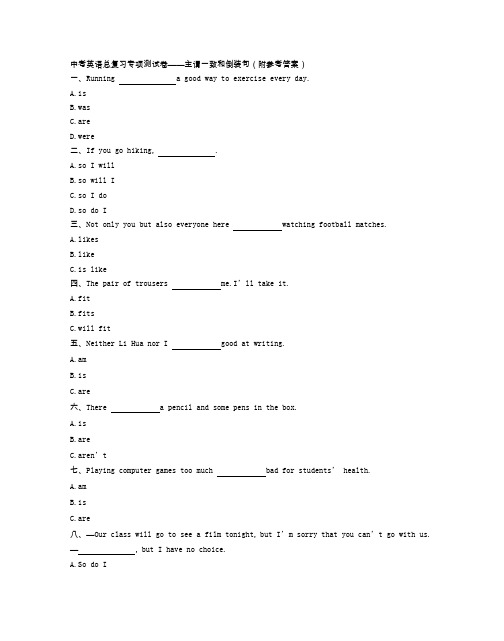
A.therewillbe
B.therewillhave
C.thereare
D.therehave
十二、—Excuseme,arethereanybookstoresaroundhere?
—,buttherearesomeonCenterStreete
参考答案
一、A
二、B
三、A
四、B
五、A
六、A
七、B
八、B
九、A
十、A
十一、A
十二、B
十三、A
十四、C
十五、D
十六、A
十七、B
十八、C
十九、D
二十、C
二十一、A
二十二、B
A.Yes,thereare
B.No,therearen’t
C.Yes,thereis
D.No,thereisn’t
十三、Thenewsveryinteresting.Tellmemore!
A.is
B.are
C.were
D.was
十四、EitherSamorJaneTVnow.
A.werewatching
D.havebeenin
十六、—I’mlearningtoplaytennis.
—.IpracticeeverydaybutI’mnotverygoodatit.
A.SoamI
B.SoIam
C.NeitheramI
D.NeitherIam
十七、EveryoneexceptTomandJohntherewhenthemeetingbegan.
B.arewatching
C.iswatching
中考复习专题--主谓一致和倒装句 (1)
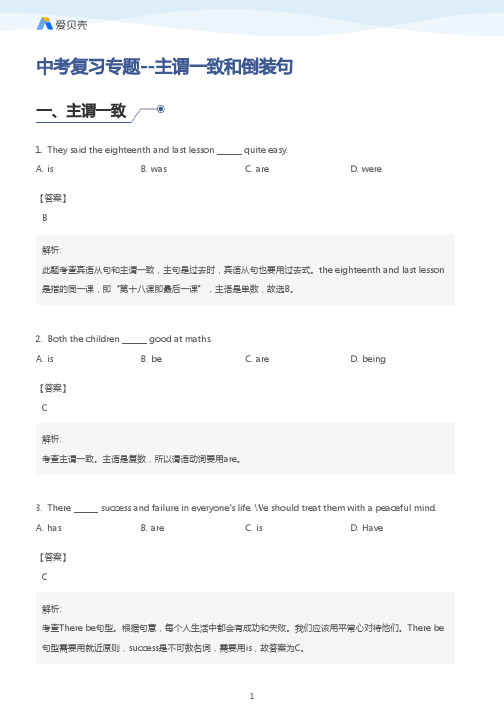
5. Neither my father nor I
going to the baseball game.
A. be
B. am
C. is
【答案】 B
解析: 考查动词。neither…nor就近原则,所以选B。
D. are
6. Neither Alice nor I A. am
from Canada. We are both from China.
2. Both the children A. is
good at maths. B. be
【答案】 C
C. are
解析: 考查主谓一致。主语是复数,所以谓语动词要用are。
D. being
3. There A. has
【答案】 C
success and failure in everyone's life. We should treat them with a peaceful mind.
B. are
C. is
D. Have
解析: 考查There be句型。根据句意,每个人生活中都会有成功和失败。我们应该用平常心对待他们。There be 句型需要用就近原则,success是不可数名词,需要用is,故答案为C。
1
4. The number of the students in this class
home.
A. is; have
B. is; has
【答案】 A
fifty, and a number of them
computers at
C. are; have
D. are; has
解析: 考查主谓一致。the number of 意为 "...的数量" ,数量作主语时,谓语动词用单数。a number of 意为 "大量的..." ,谓语动词与其修饰的名词保持一致,应用复数。故选A。
(完整版)初中英语主谓一致的用法及专项练习题带答案解析
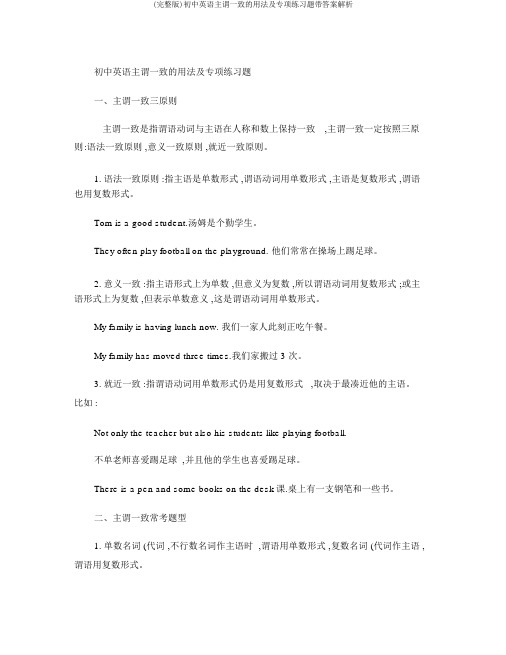
初中英语主谓一致的用法及专项练习题一、主谓一致三原则主谓一致是指谓语动词与主语在人称和数上保持一致,主谓一致一定按照三原则:语法一致原则 ,意义一致原则 ,就近一致原则。
1.语法一致原则 :指主语是单数形式 ,谓语动词用单数形式 ,主语是复数形式 ,谓语也用复数形式。
Tom is a good student.汤姆是个勤学生。
They often play football on the playground. 他们常常在操场上踢足球。
2.意义一致 :指主语形式上为单数 ,但意义为复数 ,所以谓语动词用复数形式 ;或主语形式上为复数 ,但表示单数意义 ,这是谓语动词用单数形式。
My family is having lunch now. 我们一家人此刻正吃午餐。
My family has moved three times.我们家搬过 3 次。
3.就近一致 :指谓语动词用单数形式仍是用复数形式 ,取决于最凑近他的主语。
比如 :Not only the teacher but also his students like playing football.不单老师喜爱踢足球 ,并且他的学生也喜爱踢足球。
There is a pen and some books on the desk课.桌上有一支钢笔和一些书。
二、主谓一致常考题型1.单数名词 (代词 ,不行数名词作主语时 ,谓语用单数形式 ,复数名词 (代词作主语 , 谓语用复数形式。
The desk is Tom’张这s.桌子是汤姆的。
Some water is in the bottle.一些水在瓶子里。
The students are playing football on the playground.这些学生正在操场上踢足球。
2.many a+单数名词作主语 ,意义虽为“很多”,但谓语要用单数形式。
Many a student has been to Shanghai许.多学生到过上海。
50套初中英语主谓一致含解析

A. is
B. are
C. was
D. were
【答案】 C
【解析】
【详解】
句意:艾丽斯和她的同学上周因违反校规而受到惩罚。考查一般过去时和主谓一致。根据
last week 可知句子时态应用一般过去时,排除 A、B 选项; together with her classmates 在
句中作状语,主语是 Alice,第三人称单数,所以谓语动词也要用第三人称单数形式,排除 D 选项;故答案选 C。
句,主句谓语是一般将来时态时,条件状语从句要用一般现在时态。故选
B。
考点:考查条件状语从句及 there be 结构。
2.Nowadays many new taxi apps (打车软件) _________ to help people travel around more
easily.
A. are used
5.It is reported that the population of China smaller in the past few months. The aging (老 龄化) is a big problem. More parents are encouraged to give birth to more babies.
A. is used to
B. used to C. used to be 【答案】 C 【解析】 试题分析:句意: ――过去山脚下有许多树。 ――但是现在因为人类的活动,它们正慢慢 地消失。 used to +动词原形,表示过去常常; be used to doing sth 表示习惯于做某事; be
含义),所以 be 动词使用 is。故选: B。 点睛: the number of 表示 “……的数量 ”,跟复数名词连用作主语时,中心词是
- 1、下载文档前请自行甄别文档内容的完整性,平台不提供额外的编辑、内容补充、找答案等附加服务。
- 2、"仅部分预览"的文档,不可在线预览部分如存在完整性等问题,可反馈申请退款(可完整预览的文档不适用该条件!)。
- 3、如文档侵犯您的权益,请联系客服反馈,我们会尽快为您处理(人工客服工作时间:9:00-18:30)。
初中英语语法过关——主谓一致、倒装句专项练习精选50题( )1.One of my friends ______ moved to America. I miss her so much.A.hasB.haveC.isD.are( )2.This is my twin sister, Lucy. Not only she but also I______ good at drawing.A.isB.amC.areD.be( )3.Ten minutes ago, there _____ an eraser,a pen and some books on the desk.A.isB.areC.wasD.were( )4.Linda,with her parents, ______ the Wolf Hill, and they will be back this afternoon.A.have gone toB.has been toC.have been toD.has gone to( )5.In 1850,about a third of the USA ______ covered with forests.A.wereB.has beenC.areD.was( )6.The population of the world ______ still _____ now.A.has;grownB.will;growC.is;grownD.is;growing( )7.As the saying goes, no news _______ good news.A.isB.areC.hasD.have( )8.Most of the boys who are good at playing basketball_____ in good health.A.isB.areC.wasD.were( )9.—Have you got any water to drink?—Here you are.There ______still some in the bottle.A.areB.hasC.isD.have( )10.Cindy together with her parents often _____ to the movies on weekends.A.goB.goesC.has goneD.have gone( )11.—Which would you like,tea or coffee?—Either______ OK, but I prefer coffee _____ tea.A.is;toB.are;withC.is;withD.are;to( )12.The whole family _______ enjoying the beautiful music now.A.is allB.all isC.all areD.are all( )13.—How much would you like to pay for the pair of shoes?—Twenty dollars _______ enough.A.beB.isC.areD.am( )14.—Physics _____ more difficult than math, do you think so?—Yes,I think so.A.isB.areC.hasD.have( )15.Everyone _______ I come from Sichuan. Actually, I come from Shanxi.A.thinksB.don’t thinkC.thinkD.doesn’t think( )16.Each man and woman _____ the same rights(权利).A.hadB.hasC.haveD.is having( )17.Climbing hills ______ of great help to our health.A.wasB.wereC.isD.are( )18.Each of the girls here ________ to the West Lake twice.A.have goneB.have beenC.has goneD.has been( )19.Neither my father nor my mother _____ rock music.They think it’s too _______.A.likes;noisyB.likes;noiseC.like;noisyD.like;noise( )20.______ of the land in this district ______ covered with trees and grass.A.Two fifths;areB.Two fifth;areC.Two fifth;isD.Two fifths;is( )21.Something _____ gone wrong with my TV set.A.hasB.haveC.isD.are( )22.Talking aloud on a mobile phone ____ impolite.A.areB.seemC.isD.look( )23.Everyone except Bill and Jim _______ there when the meeting began.A.wasB.isC.areD.were( )24.Half of the students _____ made the suggestions.A.hasB.haveC.isD.are( )25.—How many classes do you usually have a day?—Six classes a day.And each of them ______ 45 minutes.ststsC.haveD.are( ) 26. The news he told you ________ very wonderful.A. isB. soundC. areD. am( ) 27. An old man with his two children ________ down the road now.A. comesB. is comingC. are comingD. was coming( ) 28. The Browns ________ getting ready for the picnic.A. areB. isC. can beD. has been( ) 29. Where ________ my glasses? I can’t find them.A. isB. areC. wasD. were( ) 30. The teacher and writer ________ to visit our school next week.A. is comingB. are comingC. have comeD. was coming( )31. Climbing hills _____ good for our health.A.areB.isC.wasD.were( )32. —What are you going to do this weekend?—I together with my classmates ____ going to climb Mount Qian.A.isB.amC.areD.Were( )33. —I called you at 5:00 yesterday afternoon,but no one answered.—Sorry,I with my parents______ at that time.A.was shoppingB.were shoppingC.are shoppingD.went shopping ( )34. A number of volunteers ____ from far away cities.A.isB.areC.is comeD.arc come( )35. The zoo keeper is worried because the number of visitors ________ smaller and smaller.A.becomeB.are becomingC.is becomingD.have become( )36. —Do you need more time to complete the task?—Yes.Another ten days ______ enough.A.isB.wasC.areD.were( )37. Look! The police _____ the food onto the bank of the river.A.am carryingB.is carryingC.are carryingD.are carried( )38. —Maths ______ my favorite subject.What about you?—Physics _______. I think it’s very interesting.A.is;isB.are;areC.are;isD.is;are( )39. Neither my sister nor I ______ been to America before.A.have everB.have neverC.has everD.has never( )40. —How soon can you finish this job?—Two days ____ enough for me to finish the work. I need a week.A.isn’tB.aren’tC.isD.are( )41. —Neither Tony nor I ____ interested in playing Weibo.—You two are out(落伍).A.amB.isC.areD.be( )42. There ______ great changes in such kind of PDAs(掌上电脑)in the last few years.A.has beenB.have beenC.has hadD.have had( )43. Across from my home,_______ a shop which sells things from foreign countries.A.it isB.it hasC.there isD.that is( )44. There ______ lots of sheep and pigs on my uncle’s farm now.A.wasB.wereC.isD.are( )45. Last year, thanks to the charity organization, some money ______ given to the poor children for their further education.A.wasB.wereC.areD.is( )46. —Sorry Sir,I’ve made so many mistakes in this paper.—It’s OK._____.This paper is very difficult.A.So have other studentsB.So do other studentsC.Neither do other studentsD.Neither have other students( )47. —He hasn’t seen that interesting film before.—_________.A.So have IB.Neither have IC.Nor do ID.So do I( )48. —Kunming is really a comfortable city to live in.—_________.The weather is pleasant.A.So it isB.So is itC.So it doesD.So does it( )49. —Will you go to Peter’s party this Saturday evening?—I haven’t decided yet.If you don’t go,________.A.so will IB.neither do IC.neither will ID.so do I( )50. —Has your mother been to London?—Yes,and _______ .We went together.A.so have IB.so I haveC.neither have ID.neither I have【参考答案】1—5 ABCDD 6—10D ABCB 11—15 ADBAA 16—20 BCDAD 21—25 ACABB 26—30 ABAAA 31—35 BBABC 36—40 ACAAA 41—45 ABCDA 46—50 ABACA。
